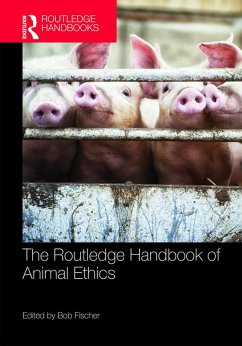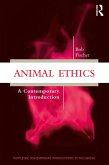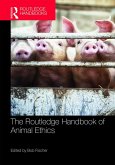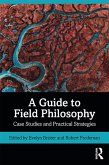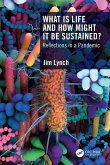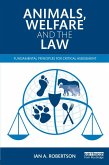The Routledge Handbook of Animal Ethics (eBook, ePUB)
Redaktion: Fischer, Bob
43,95 €
43,95 €
inkl. MwSt.
Sofort per Download lieferbar

22 °P sammeln
43,95 €
Als Download kaufen

43,95 €
inkl. MwSt.
Sofort per Download lieferbar

22 °P sammeln
Jetzt verschenken
Alle Infos zum eBook verschenken
43,95 €
inkl. MwSt.
Sofort per Download lieferbar
Alle Infos zum eBook verschenken

22 °P sammeln
The Routledge Handbook of Animal Ethics (eBook, ePUB)
Redaktion: Fischer, Bob
- Format: ePub
- Merkliste
- Auf die Merkliste
- Bewerten Bewerten
- Teilen
- Produkt teilen
- Produkterinnerung
- Produkterinnerung

Bitte loggen Sie sich zunächst in Ihr Kundenkonto ein oder registrieren Sie sich bei
bücher.de, um das eBook-Abo tolino select nutzen zu können.
Hier können Sie sich einloggen
Hier können Sie sich einloggen
Sie sind bereits eingeloggt. Klicken Sie auf 2. tolino select Abo, um fortzufahren.

Bitte loggen Sie sich zunächst in Ihr Kundenkonto ein oder registrieren Sie sich bei bücher.de, um das eBook-Abo tolino select nutzen zu können.
This interdisciplinary handbook covers everything from animal cognition to the state of current fisheries, from genetic modification to intersection animal activism. It is a rich resource on the moral issues of human interactions with animals.
- Geräte: eReader
- mit Kopierschutz
- eBook Hilfe
Andere Kunden interessierten sich auch für
![Animal Ethics (eBook, ePUB) Animal Ethics (eBook, ePUB)]() Bob FischerAnimal Ethics (eBook, ePUB)37,95 €
Bob FischerAnimal Ethics (eBook, ePUB)37,95 €![The Routledge Handbook of Animal Ethics (eBook, PDF) The Routledge Handbook of Animal Ethics (eBook, PDF)]() The Routledge Handbook of Animal Ethics (eBook, PDF)43,95 €
The Routledge Handbook of Animal Ethics (eBook, PDF)43,95 €![A Guide to Field Philosophy (eBook, ePUB) A Guide to Field Philosophy (eBook, ePUB)]() A Guide to Field Philosophy (eBook, ePUB)45,95 €
A Guide to Field Philosophy (eBook, ePUB)45,95 €![Japan's Withdrawal from International Whaling Regulation (eBook, ePUB) Japan's Withdrawal from International Whaling Regulation (eBook, ePUB)]() Japan's Withdrawal from International Whaling Regulation (eBook, ePUB)41,95 €
Japan's Withdrawal from International Whaling Regulation (eBook, ePUB)41,95 €![Dialogues on Ethical Vegetarianism (eBook, ePUB) Dialogues on Ethical Vegetarianism (eBook, ePUB)]() Michael HuemerDialogues on Ethical Vegetarianism (eBook, ePUB)19,95 €
Michael HuemerDialogues on Ethical Vegetarianism (eBook, ePUB)19,95 €![What Is Life and How Might It Be Sustained? (eBook, ePUB) What Is Life and How Might It Be Sustained? (eBook, ePUB)]() Jim LynchWhat Is Life and How Might It Be Sustained? (eBook, ePUB)21,95 €
Jim LynchWhat Is Life and How Might It Be Sustained? (eBook, ePUB)21,95 €![Animals, Welfare and the Law (eBook, ePUB) Animals, Welfare and the Law (eBook, ePUB)]() Ian A. RobertsonAnimals, Welfare and the Law (eBook, ePUB)49,95 €
Ian A. RobertsonAnimals, Welfare and the Law (eBook, ePUB)49,95 €-
-
-
This interdisciplinary handbook covers everything from animal cognition to the state of current fisheries, from genetic modification to intersection animal activism. It is a rich resource on the moral issues of human interactions with animals.
Dieser Download kann aus rechtlichen Gründen nur mit Rechnungsadresse in A, B, BG, CY, CZ, D, DK, EW, E, FIN, F, GR, HR, H, IRL, I, LT, L, LR, M, NL, PL, P, R, S, SLO, SK ausgeliefert werden.
Produktdetails
- Produktdetails
- Verlag: Taylor & Francis
- Seitenzahl: 602
- Erscheinungstermin: 6. Dezember 2019
- Englisch
- ISBN-13: 9781351602365
- Artikelnr.: 58386622
- Verlag: Taylor & Francis
- Seitenzahl: 602
- Erscheinungstermin: 6. Dezember 2019
- Englisch
- ISBN-13: 9781351602365
- Artikelnr.: 58386622
- Herstellerkennzeichnung Die Herstellerinformationen sind derzeit nicht verfügbar.
Bob Fischer is Associate Professor of Philosophy at Texas State University. He is the author of The Ethics of Eating Animals (Routledge, 2019) and Animal Ethics: A Contemporary Introduction (Routledge, 2020).
Introduction 1. Psychological Mechanisms Involved in Human- Animal
Interactions: How Do Humans Cognize About Animals 2. Understanding the
Moral Implications of Morgan's Canon 3. Animal Intelligence 4. The
Emotional Lives of Animals 5. Animal Self-Awareness: Types, Distribution,
and Ethical Significance 6. The Moral Animal 7. Quantifying Animal
Well-Being and Overcoming the Challenge of Interspecies Comparisons 8.
Cost-Effectiveness in Animal Health: An Ethical Analysis 9. The Origins of
Factory Farming in the United States: An Overview 10. The Economics of
Intensive Animal Agriculture 11. Animal Welfare-Is Intensification the
Problem? 12. Intensive Animal Agriculture and the Environment 13. Intensive
Animal Agriculture and Human Health 14. Seafood Ethics: Reconciling Human
Well-being with Fish Welfare 15. Small-Scale Animal Agriculture 16.
Subsistence Hunting 17. Institutionalized Ethical Assessments of Animal
Experiments 18. Animal Models: Problems and Prospects 19. Applied Ethics in
Animal Experimentation 20. Genetic Engineering of Nonhuman Animals 21.
Building Ethical De-extinction Programs: Considerations of Animal Welfare
in Genetic Rescue 22. Pets 23. The Ethics of Domestication 24. The Ethics
of Keeping Pets 25. The Ethics of Companion Animal Euthanasia 26. Links
Between Violence Against Humans and Nonhuman Animals: Examining the Role of
Adverse Family Environments 27. Zoos and Aquariums Committing to Integrated
Species Conservation 28. The Educational Value of Zoos: An Empirical
Perspective 29. Moral Arguments Against Zoos 30. Defensible Zoos and
Aquariums 31. Killing for Conservation: Ethical Considerations for
Controlling Wild Animals 32. Ethical Dimensions of Invasive Animal
Management 33. Property, Regulation, and Endangered Species Conservation
34. The Laissez-Faire View: Why We're Not Normally Required to Assist Wild
Animals 35. Welfare Biology 36. Wild Animals as Political Subjects 37. The
History of Animal Activism: Intersectional Advocacy and the American Humane
Movement 38. The Political and Cultural Sociology of Animal Advocacy 39.
Beyond Compare: Intersectionality and Interspecieism for Co-liberation With
Other Animals 40. Political Lobbying for Animals 41. Effective Animal
Advocacy 42. Cultured Meat: A New Story for the Future of Food 43.
Veganism, (Almost) Harm-Free Animal Flesh, and Nonmaleficence: Navigating
Dietary Ethics in an Unjust World 44. Animal Sanctuaries
Interactions: How Do Humans Cognize About Animals 2. Understanding the
Moral Implications of Morgan's Canon 3. Animal Intelligence 4. The
Emotional Lives of Animals 5. Animal Self-Awareness: Types, Distribution,
and Ethical Significance 6. The Moral Animal 7. Quantifying Animal
Well-Being and Overcoming the Challenge of Interspecies Comparisons 8.
Cost-Effectiveness in Animal Health: An Ethical Analysis 9. The Origins of
Factory Farming in the United States: An Overview 10. The Economics of
Intensive Animal Agriculture 11. Animal Welfare-Is Intensification the
Problem? 12. Intensive Animal Agriculture and the Environment 13. Intensive
Animal Agriculture and Human Health 14. Seafood Ethics: Reconciling Human
Well-being with Fish Welfare 15. Small-Scale Animal Agriculture 16.
Subsistence Hunting 17. Institutionalized Ethical Assessments of Animal
Experiments 18. Animal Models: Problems and Prospects 19. Applied Ethics in
Animal Experimentation 20. Genetic Engineering of Nonhuman Animals 21.
Building Ethical De-extinction Programs: Considerations of Animal Welfare
in Genetic Rescue 22. Pets 23. The Ethics of Domestication 24. The Ethics
of Keeping Pets 25. The Ethics of Companion Animal Euthanasia 26. Links
Between Violence Against Humans and Nonhuman Animals: Examining the Role of
Adverse Family Environments 27. Zoos and Aquariums Committing to Integrated
Species Conservation 28. The Educational Value of Zoos: An Empirical
Perspective 29. Moral Arguments Against Zoos 30. Defensible Zoos and
Aquariums 31. Killing for Conservation: Ethical Considerations for
Controlling Wild Animals 32. Ethical Dimensions of Invasive Animal
Management 33. Property, Regulation, and Endangered Species Conservation
34. The Laissez-Faire View: Why We're Not Normally Required to Assist Wild
Animals 35. Welfare Biology 36. Wild Animals as Political Subjects 37. The
History of Animal Activism: Intersectional Advocacy and the American Humane
Movement 38. The Political and Cultural Sociology of Animal Advocacy 39.
Beyond Compare: Intersectionality and Interspecieism for Co-liberation With
Other Animals 40. Political Lobbying for Animals 41. Effective Animal
Advocacy 42. Cultured Meat: A New Story for the Future of Food 43.
Veganism, (Almost) Harm-Free Animal Flesh, and Nonmaleficence: Navigating
Dietary Ethics in an Unjust World 44. Animal Sanctuaries
Introduction 1. Psychological Mechanisms Involved in Human- Animal
Interactions: How Do Humans Cognize About Animals 2. Understanding the
Moral Implications of Morgan's Canon 3. Animal Intelligence 4. The
Emotional Lives of Animals 5. Animal Self-Awareness: Types, Distribution,
and Ethical Significance 6. The Moral Animal 7. Quantifying Animal
Well-Being and Overcoming the Challenge of Interspecies Comparisons 8.
Cost-Effectiveness in Animal Health: An Ethical Analysis 9. The Origins of
Factory Farming in the United States: An Overview 10. The Economics of
Intensive Animal Agriculture 11. Animal Welfare-Is Intensification the
Problem? 12. Intensive Animal Agriculture and the Environment 13. Intensive
Animal Agriculture and Human Health 14. Seafood Ethics: Reconciling Human
Well-being with Fish Welfare 15. Small-Scale Animal Agriculture 16.
Subsistence Hunting 17. Institutionalized Ethical Assessments of Animal
Experiments 18. Animal Models: Problems and Prospects 19. Applied Ethics in
Animal Experimentation 20. Genetic Engineering of Nonhuman Animals 21.
Building Ethical De-extinction Programs: Considerations of Animal Welfare
in Genetic Rescue 22. Pets 23. The Ethics of Domestication 24. The Ethics
of Keeping Pets 25. The Ethics of Companion Animal Euthanasia 26. Links
Between Violence Against Humans and Nonhuman Animals: Examining the Role of
Adverse Family Environments 27. Zoos and Aquariums Committing to Integrated
Species Conservation 28. The Educational Value of Zoos: An Empirical
Perspective 29. Moral Arguments Against Zoos 30. Defensible Zoos and
Aquariums 31. Killing for Conservation: Ethical Considerations for
Controlling Wild Animals 32. Ethical Dimensions of Invasive Animal
Management 33. Property, Regulation, and Endangered Species Conservation
34. The Laissez-Faire View: Why We're Not Normally Required to Assist Wild
Animals 35. Welfare Biology 36. Wild Animals as Political Subjects 37. The
History of Animal Activism: Intersectional Advocacy and the American Humane
Movement 38. The Political and Cultural Sociology of Animal Advocacy 39.
Beyond Compare: Intersectionality and Interspecieism for Co-liberation With
Other Animals 40. Political Lobbying for Animals 41. Effective Animal
Advocacy 42. Cultured Meat: A New Story for the Future of Food 43.
Veganism, (Almost) Harm-Free Animal Flesh, and Nonmaleficence: Navigating
Dietary Ethics in an Unjust World 44. Animal Sanctuaries
Interactions: How Do Humans Cognize About Animals 2. Understanding the
Moral Implications of Morgan's Canon 3. Animal Intelligence 4. The
Emotional Lives of Animals 5. Animal Self-Awareness: Types, Distribution,
and Ethical Significance 6. The Moral Animal 7. Quantifying Animal
Well-Being and Overcoming the Challenge of Interspecies Comparisons 8.
Cost-Effectiveness in Animal Health: An Ethical Analysis 9. The Origins of
Factory Farming in the United States: An Overview 10. The Economics of
Intensive Animal Agriculture 11. Animal Welfare-Is Intensification the
Problem? 12. Intensive Animal Agriculture and the Environment 13. Intensive
Animal Agriculture and Human Health 14. Seafood Ethics: Reconciling Human
Well-being with Fish Welfare 15. Small-Scale Animal Agriculture 16.
Subsistence Hunting 17. Institutionalized Ethical Assessments of Animal
Experiments 18. Animal Models: Problems and Prospects 19. Applied Ethics in
Animal Experimentation 20. Genetic Engineering of Nonhuman Animals 21.
Building Ethical De-extinction Programs: Considerations of Animal Welfare
in Genetic Rescue 22. Pets 23. The Ethics of Domestication 24. The Ethics
of Keeping Pets 25. The Ethics of Companion Animal Euthanasia 26. Links
Between Violence Against Humans and Nonhuman Animals: Examining the Role of
Adverse Family Environments 27. Zoos and Aquariums Committing to Integrated
Species Conservation 28. The Educational Value of Zoos: An Empirical
Perspective 29. Moral Arguments Against Zoos 30. Defensible Zoos and
Aquariums 31. Killing for Conservation: Ethical Considerations for
Controlling Wild Animals 32. Ethical Dimensions of Invasive Animal
Management 33. Property, Regulation, and Endangered Species Conservation
34. The Laissez-Faire View: Why We're Not Normally Required to Assist Wild
Animals 35. Welfare Biology 36. Wild Animals as Political Subjects 37. The
History of Animal Activism: Intersectional Advocacy and the American Humane
Movement 38. The Political and Cultural Sociology of Animal Advocacy 39.
Beyond Compare: Intersectionality and Interspecieism for Co-liberation With
Other Animals 40. Political Lobbying for Animals 41. Effective Animal
Advocacy 42. Cultured Meat: A New Story for the Future of Food 43.
Veganism, (Almost) Harm-Free Animal Flesh, and Nonmaleficence: Navigating
Dietary Ethics in an Unjust World 44. Animal Sanctuaries
